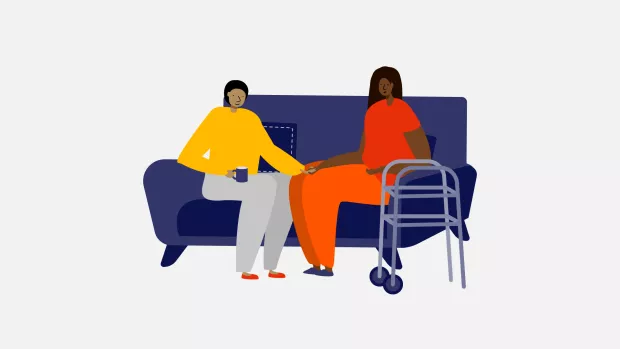
My (gender free) tips to improve sexual sensations and encounters with MS
As you know, MS is a super-unpredictable illness. Affecting our bodies in so many ways it’s hard to keep track.
In the community we regularly talk about fatigue management, bowel troubles and disease modifying therapies (DMTs). But we rarely, if ever, dip our toes into the topic of sex.
It got me wondering, why is that? Is it embarrassment? Fear? Or something else entirely?
So I thought I’d share some of my favourite tips that have improved sexual encounters and sensations after my MS diagnosis.
My 5 top tips
1. Using a vibrator every day
Spend 5 to 15 minutes to increase stimulation and arousal in the genitals. You could use a wand vibrator – they’re discreet and powerful. Increase intensity slowly. Breathe deeply. You may feel tingling sensations as your body relaxes into it.
I find the Hot Octopus Company a great place to find what you want. They offer diverse and accessible sex toys for every gender identity. These include products designed for all bodies, solo and couples.
Remember to always read the manual before a play session.
2. Lube is your best friend
I stick with liquid or jelly water based lubes. Using a lube can increase sensations, heighten pleasure and reduce dryness for couple, group or solo playtimes.
3. Set your boundaries
Know what you’re comfortable doing. If you’re not comfortable with something, express it to your partner, or share an alternative way that works for you. If your sexuality has changed, remember only you know what’s right for your own body. So listen to it.
4. Talk to your doctor and nurses
I know it’s hard, and frankly I think doctors need to actively bring up these types of conversations more with patients. Normalise them so they feel as easy as getting your blood pressure checked.
MS sexual dysfunction is more common than you think, and so many people suffer in silence. Have the conversation with your doctor so you can find out if there are medications and exercises that can help improve it.
Remember illnesses don’t have to mean the loss of your sexuality or sexual pleasure. Adaptations and adapting is key. No matter the level of mobility there will always be ways to achieve pleasure.
5. Get comfortable
Specially designed pillows and other aids can help you have a more comfortable, pleasurable experience. If you search ‘sex furniture disability’ you’ll find there’s loads of choice online. I like the pillows from The Pleasure Garden inclusive sex shop. These can be really good for added support if you've got limited mobility, fatigue or stiffness. The shop even provides a service to help you choose the right aid for your ability.
Other options are swings, stools and chairs. They might help you find your perfect position and make intercourse easier and more enjoyable.
Remember, always read the instructions, go slow with anything new, and do ask your doctor or nurse if you’re worried about anything.
There’s different ways to be intimate
Hugging, kissing, touch and sharing space can be as fulfilling as penetration.
Maybe Tantric sex could be for you? What is Tantric sex you say!
Tantric sex is ‘the art of weaving and expansion of energy’. An ancient Hindu practice that has been around for over 5,000 years, it’s a slow form of sex. It’s said to increase intimacy and create a mind-body connection that can lead to powerful orgasms, and improve both physical and mental connections.
Remember that full intercourse is not the only intimacy that exists. Self-love and kindness is the most important form of intimacy you can give yourself.
So practice some self-love and know you’re not alone. There’s a community of people who understand, and are ready to bring light to sometimes uncomfortable conversations we all need to have.
Roxy is taking part in an An Integrated Psychosexual Intervention for Sexual Difficulties in People with Multiple Sclerosis, alongside Dr Ashley Brown from Kings College, and led by Professor Rona Moss-Morris.
Read more about MS, sex and relationships




